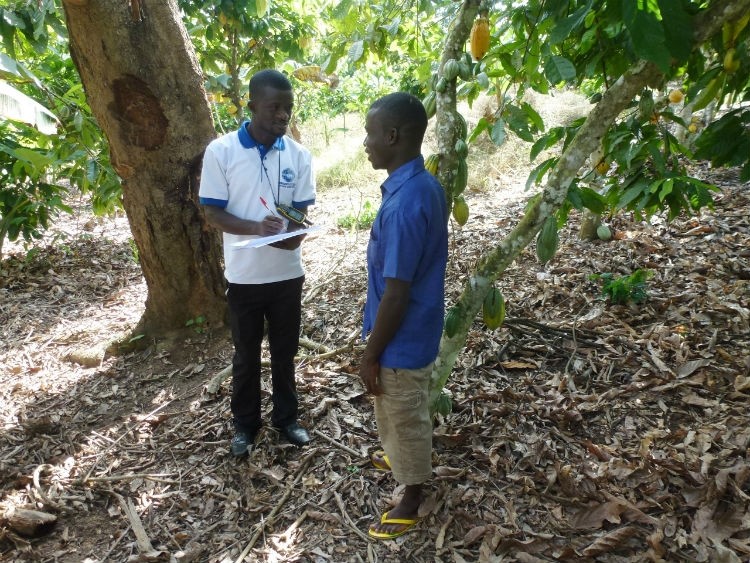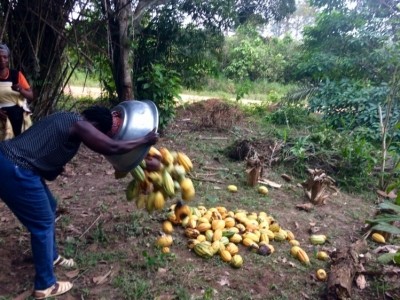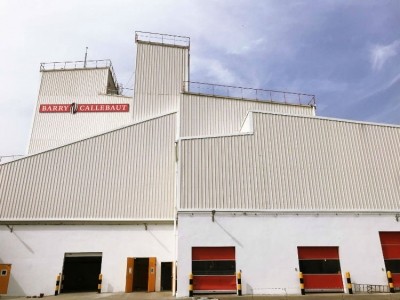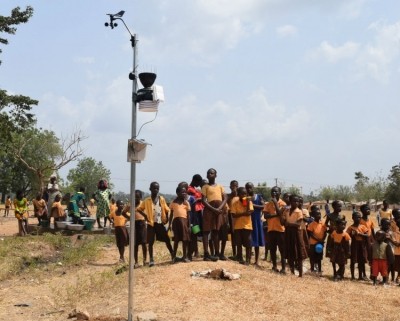Environment
Ghana and Côte d’Ivoire announce joint action plans to end deforestation in cocoa sector

The world’s leading chocolate and cocoa companies have backed plans released today by the World Cocoa Foundation (WCF) to end deforestation and restore forest areas in the top cocoa-producing countries of Côte d’Ivoire and Ghana.
WCF’s public disclosure is part of the implementation commitments of the Cocoa & Forests Initiative (CFI), which was launched in November 2017 at the UN Climate Change Conference in Bonn, Germany.
The three-tiered plans by governments of Côte d’Ivoire and Ghana focus on forest protection and restoration, sustainable cocoa production and farmers’ livelihoods, and community engagement and social inclusion.
In a release, the WCF says the governments and companies have committed to no further conversion of any forest land for cocoa production and have pledged to eliminate illegal cocoa production in protected areas, in line with stronger enforcement of national forest policies and development of alternative livelihoods for affected farmers.
“These combined actions will play a crucial role in sequestering carbon stocks and addressing global and local climate change, in line with the Paris Climate Agreement,” says the WCF.
Milestone
Each company will publicly disclose its own individual initial plan over the next three weeks, but a milestone has been reached in strengthening transparency and accountability in the cocoa supply chain to reduce its impact on West African forests.
The National Plan for Côte d’Ivoire builds on the new Declaration of Policy for Forest Preservation, Rehabilitation and Extension adopted by the government in May 2018. Key strategic priorities include passage of the new Forest Code (readied for final approval by the National Assembly in April 2019), creation of a National Forest Preservation and Rehabilitation Fund, development and implementation of the national cocoa traceability system, and implementation of pilot projects in five priority regions.
Companies that have signed the CFI
Companies that have signed the Framework for Action of the Cocoa & Forests Initiative are Arysta Callivoire, Barry Callebaut, Blommer Chocolate Company, Cargill Cocoa and Chocolate, Cémoi, Chocolats Halba, Cocoanect, Cococo Chocolatiers, ECOM Group, Fazer, Ferrero, General Mills Inc., Godiva Chocolatier Inc., Guittard Chocolate Company, The Hershey Company, Indcresa, Lindt & Sprüngli Group, Marks & Spencer Food, Mars Wrigley Confectionery, Meiji Co. Ltd., Mondelēz International, Nestlé, Olam Cocoa, PBC Limited, Sainsbury’s, SIAT, Tesco, Toms Group, Touton, Tree Global, Unilever, Valrhona, and J.H. Whittaker & Sons.
The National Plan for Ghana leverages the Ghana Cocoa Forest REDD+ Program to significantly reduce greenhouse gas emissions from deforestation and enhance carbon stocks through sustainable forest management.
The WCF says priority actions are to scale up landscape approaches to end forest degradation in ‘six Hotspot Intervention Areas’, improve cocoa yields through adoption of environmentally sound climate-smart practices, and strengthen supply chain mapping.
Côte d’Ivoire Minister of Water and Forests Alain-Richard Donwahi said: “Ending deforestation is a complex social, economic, and environmental challenge. Our new Forest Policy adds momentum for sustainable management of Côte d’Ivoire’s forests, and our National Plan for the Cocoa & Forests Initiative defines the key actions that the government will take. We welcome the initial action plans of industry, and look forward to robust implementation of these public and private commitments to restore our forest heritage and ensure sustainable livelihoods for cocoa farmers.”
Ghana Minister of Lands and Natural Resources Kwaku Asomah-Cheremeh said: “The Ghana National Plan for the Cocoa & Forests Initiative is a critical building block in our strategic framework for sustainable economic growth. We aim to secure the future of our forests and make the cocoa sector climate-resilient, whilst sustaining and enhancing income and livelihood opportunities for farmers and forest users. Partnership with the private sector is critical to unleash the financing and technical knowledge for climate-smart cocoa production and reduced emissions from deforestation.”
Key significant steps outlined in the joint action plans include:
- Government collection of land use and socio-economic surveys in priority areas to collect baseline data for the design of new agro-forestry and conservation programs;
- Development of farm mapping and traceability systems to ensure cocoa is sourced legally from farms outside of protected areas and monitor where cocoa from deforested areas could enter into the supply chain;
- Development of new landscape corridors to connect up fragmented forest reserves, and community-based landscape management to scale up conservation efforts through broader “jurisdictional approaches;”
- Investments in sustainable agricultural intensification in order to “grow more cocoa on land,” with a focus on climate-smart production techniques, farmer training, increased access to financing, and new government operational guidelines and company investment for agroforestry;
- Launch of payments for environmental services contracts directly with farmers to promote environmentally sustainable agricultural practices and investment in ecosystem services;
- Government land tenure reforms and tools that allow farmers to obtain official ownership of valuable non-cocoa trees on their farms and thereby encourage investment in agro-forestry; and
- Use of satellite monitoring to track illegal deforestation in hotspot areas and issue deforestation alerts.
World Cocoa Foundation chairman Barry Parkin said: “The industry committed in 2017 to partner with cocoa producing governments to end deforestation in the supply chain. The disclosure of the initial company action plans is a major milestone to ensure transparency and accountability for our commitment. As we implement key actions on the ground, we look forward to partnering with international financial organizations to mobilize financing, garner knowledge, and technical assistance to scale up impact.”








